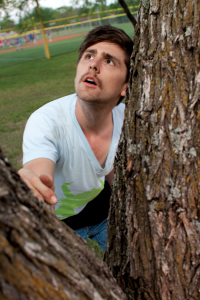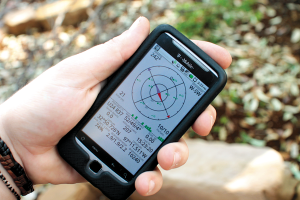By Casey Holder/photo editor

NE Campus student Scott Worley threaded his bicycle carefully through the thicket of parents and siblings crowding Richfield Park in North Richland Hills for Friday night baseball.
His head down as he rode, he locked his eyes on the

GPS screen blinking on his BlackBerry. Unlike the rest of the patrons milling around the park, Worley moved with purpose.
The blinking blimp on his GPS led him straight to an unused scoreboard behind a field where a little league team practiced. Up one of the support poles he went, and back down he came with a plastic magnetic Hide-A-Key. From inside, he removed a long, tattered form, which he signed, and a white, unlabeled guitar pick.
Worley had successfully found a geocache.
The world goes about its day, unaware of the treasure hunt taking place right underneath

its muggle noses.
The treasure isn’t valuable, usually a small token or a bouncy ball. But for those geocachers on the chase, the thrill of finding this treasure is priceless.
The website geocaching.com claims more than 1 million active users. All seven continents, even Antarctica, host one or more of its registered hidden waterproof containers.
Each container must include a physical log and is hidden by an individual who then records the GPS coordinates and registers those coordinates along with some attributes to the geocaching database. After approval from Groundspeak, the company that oversees geocaching.com, the cache’s coordinates are published worldwide, and geocachers can begin to search for it.
“Who doesn’t want to go have a freaking treasure hunt or have something that you’re looking for that most people don’t know is there,” said NE Campus student Jeff Southerland. “Most people will never even think about it ever in their life, but you know it’s

there. And that’s cool.”
Muggle is a term cachers borrowed from Harry Potter to describe the uninformed public who often ruin or destroy geocaches out of ignorance.
The sport was born after the removal of “selective availability” from civilian GPS units during the 1990s. This function intentionally denied accuracy to civilian units, rendering them obsolete as tools of navigation. This newly available public access allowed for small objects to be hidden and located with ease by way of inexpensive handheld GPS units.
Within 24 hours, the first “GPS stash” was hidden and its coordinates logged online. It was found two days later, and by September 2000, geocaching.com was active.
The game is based on the 150-year-old orienteering game of letterboxing where clues and hints are given along with landmarks and paces, but, ultimately, players find a hidden container with a logbook and stamp.
The hobby has seen a recent surge of growth with the increasing ownership of GPS-

Photos by Casey Holder/The Collegian
enabled smart phones. Groundspeak, the company that evolved out of geocaching.com, has developed geocaching applications for the iPhone, Android and BlackBerry platforms.
“It’s very user-friendly,” Worley said about his app.
The apps cost about $10 and include a compass and radar to navigate geocachers to caches with ease and style. If 10 bucks is too much for a college student on a budget, “c:geo” is an Android application that provides all the same services as the official Groundspeak app at no cost.
Like any good hobby, geocaching has its own language of cryptic terminology. Acronyms such as B.Y.O.P. (bring your own pen) and I.C.T. (ivy covered tree) are often used in geocache listings to help aid future cachers.
And all cachers worth their salt will leave a T.F.T.C. (thanks for the cache) along with their aliases when signing a geocache’s log.
Geocaches are everywhere — including all five TCC campuses. The fun part is finding them.
“Geocaching is a series of disappointments followed by one magical moment where you finally find what you’ve been looking for,” Worley said.




























